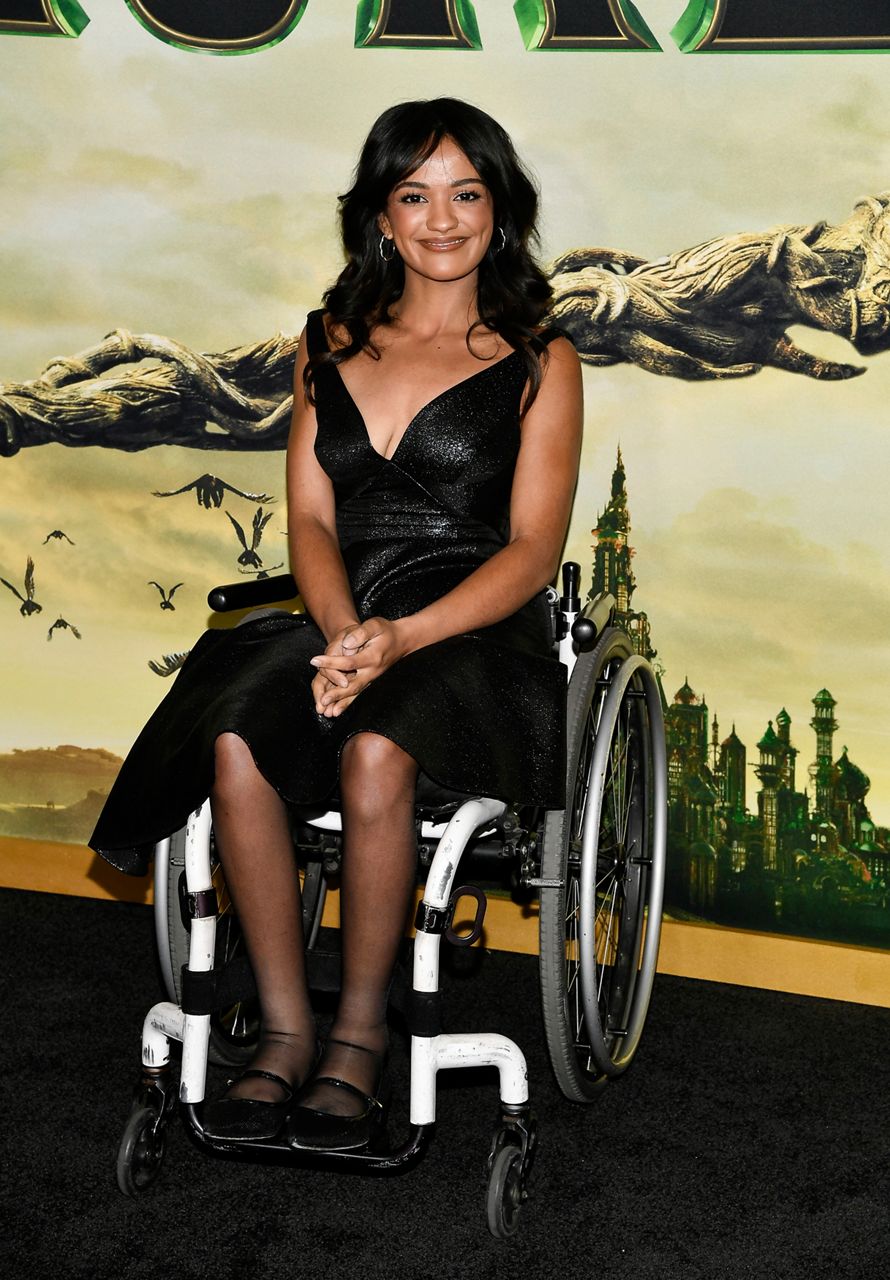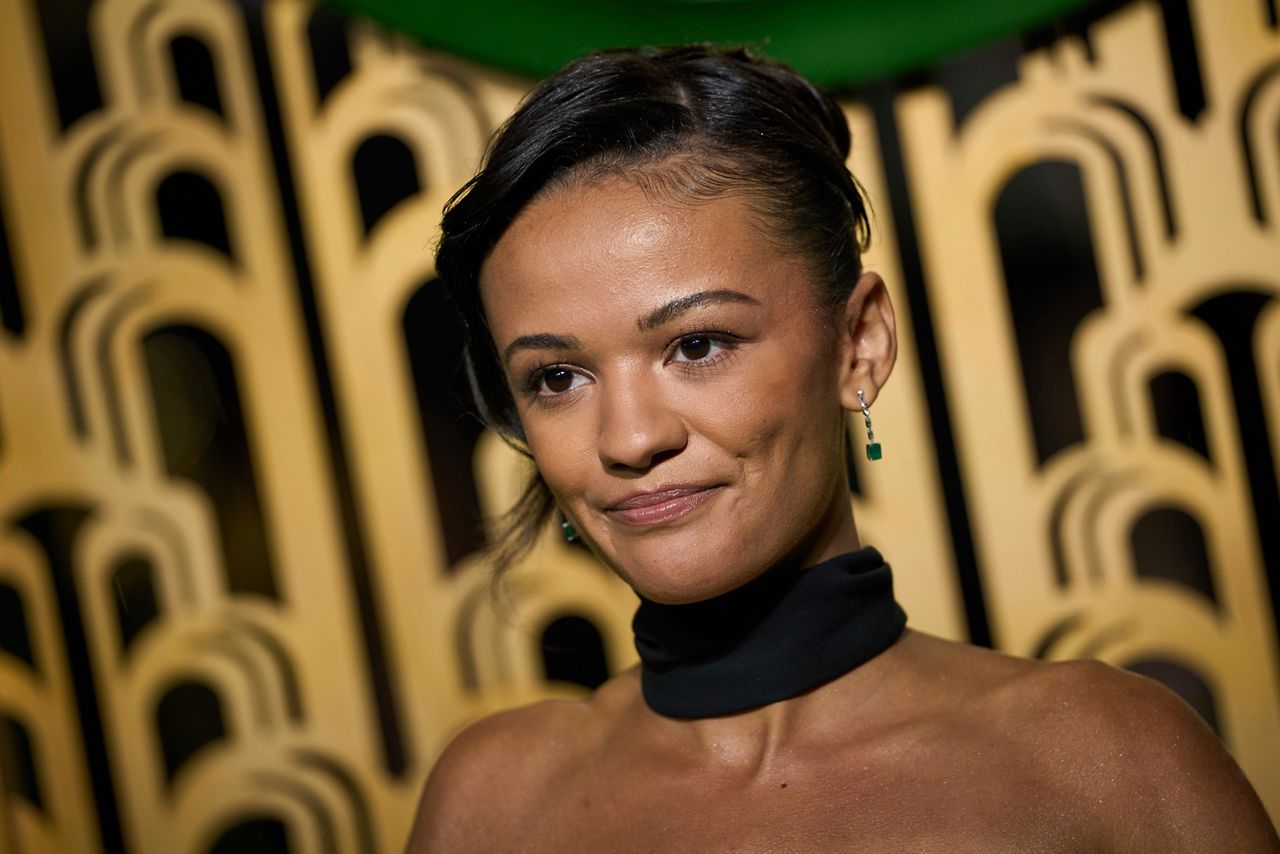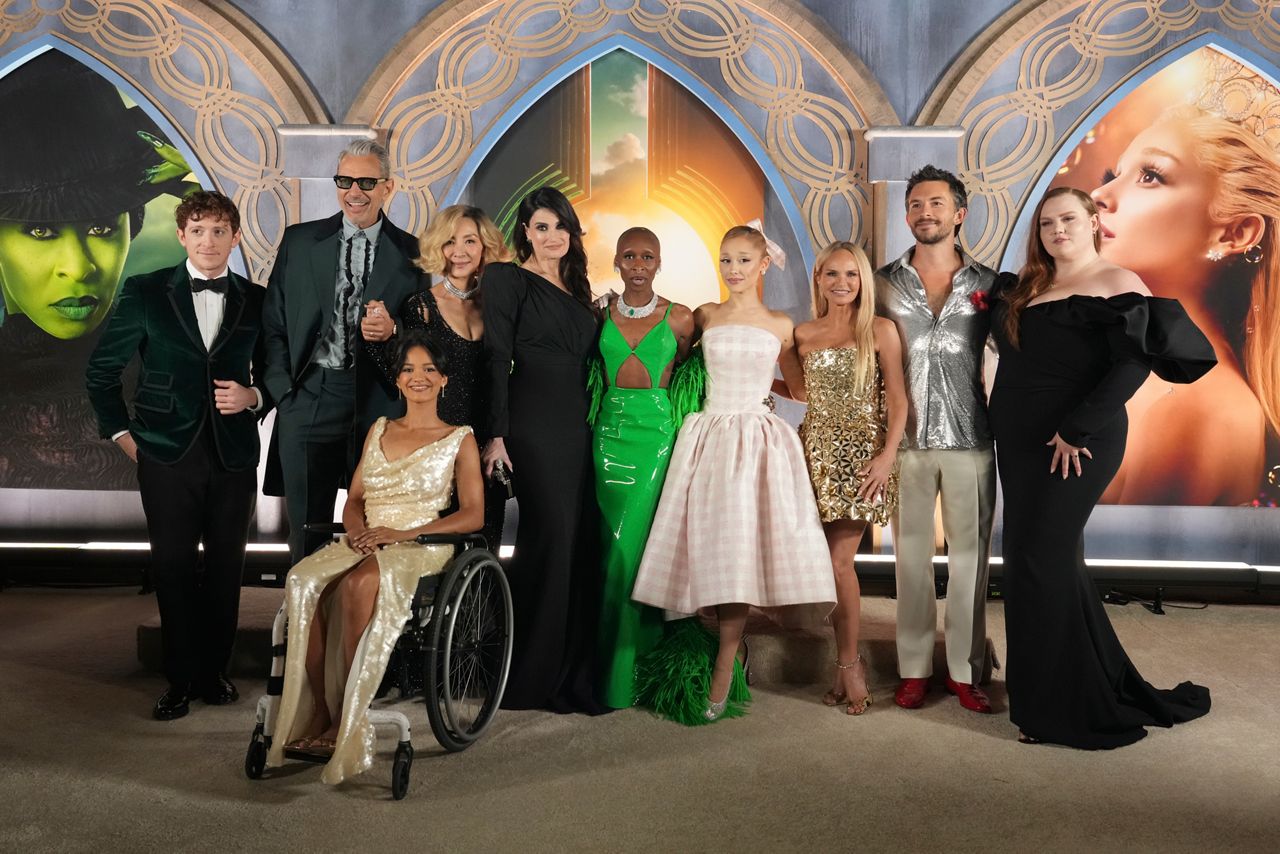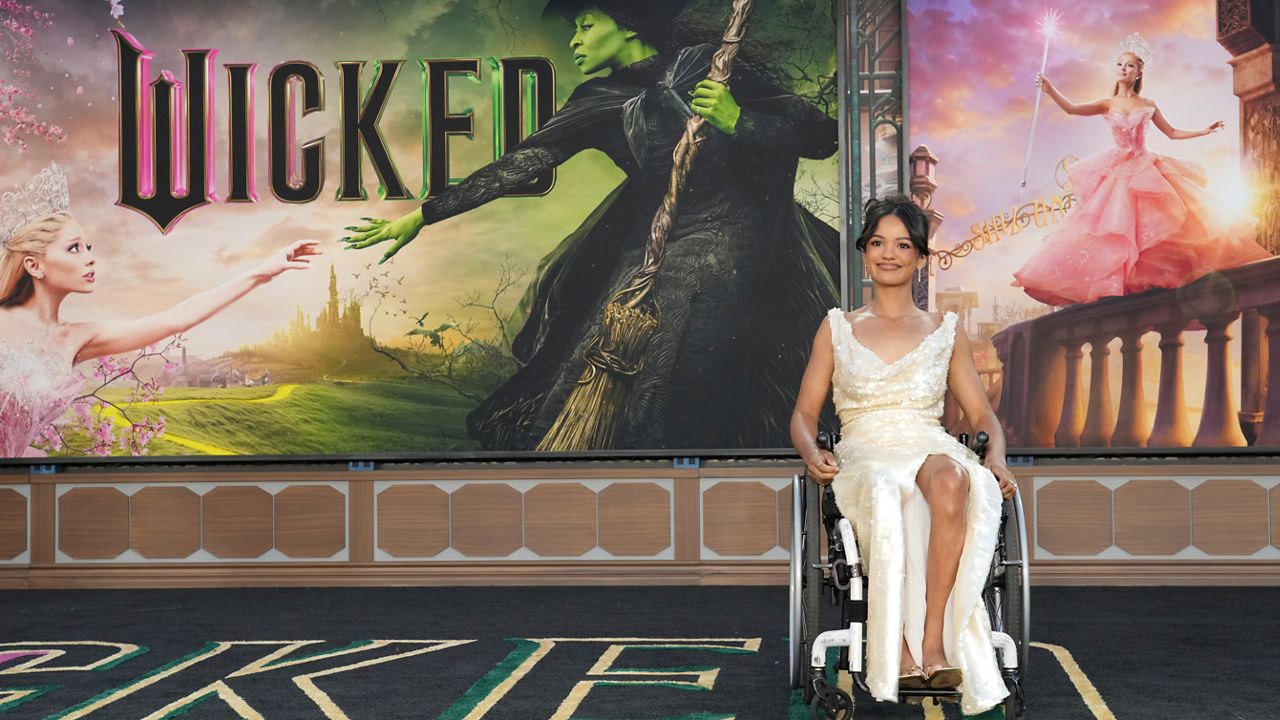MAZOMANIE, Wis. — A small town Wisconsin woman is becoming more and more “popular” as the “Wicked” film continues to break records.
Marissa Bode, who plays Nessarose — also known as Elphaba’s younger sister — in the film, hails from Mazomanie, Wis. On the road from Mazomanie to Munchkinland, Bode made stops at The American Musical and Dramatic Academy in New York, where she earned her bachelor’s degree, and Los Angeles, where she now lives.

The yellow brick road from Wisconsin to ‘Wicked’
Bode started performing with the Wisconsin Heights Players at the young age of 8 — which is how old you had to be to join, she said.
Her first role was an orphan in Prince and the Pauper. Bode had just two lines. She admitted she was always a little shy, but as she kept performing, she gained more and more confidence.
She kept up theater through elementary, middle and high school. Bode eventually started taking voice lessons and joined choir.
“I have so many fond memories of exploring with the arts in Mazo and within the community. I think that’s really where I fell in love with it and fell in love with how much fun it can be,” the 2018 Wisconsin Heights High School graduate said.
And it was in her Wisconsin community where she first saw “Wicked” when she was 11-years-old. The Broadway musical was touring, stopping at the Overture Center for the Arts in Madison. Bode’s mom surprised her with tickets to see the show.
It was within the same year that Bode had been in a car accident that left her paralyzed from the waist down. She has utilized a wheelchair ever since.
“Seeing a character in a wheelchair was really cool, because I had never seen a character in a wheelchair on stage before,” Bode explained. “[Seeing Nessarose] was really special for me.”
Bode explained she felt isolated. There were other kids at her school with disabilities, but she never reached out to them. She wasn’t ready, she recalled.
“It was a little bit of an isolating feeling, especially since I didn’t know anything about disability and disability just isn’t taught at all,” she said. “When you don’t know anything about something that’s very new to your life, of course it’s going to be scary. Which I know now that it just isn’t.”
Bode remembered struggling to navigate her new normal, which included people pitying her in a way she had never felt before. She struggled with people making her uncomfortable, even if they had good intentions.
To top it off, she didn’t see any representation of people in wheelchairs in the art form she already loved so much at a young age. Until “Wicked.”
“Seeing a character like that on stage that was really cool for me to see at all, because there really just wasn’t much out there. Where I am now and having that be authentic and for other kids and just even disabled adults — to know that someone that looks like them is on the big screen and is in this major film — is really cool and I’ve received just really special messages from people,” Bode said.
Bode said she is the first person to portray Nessarose who also uses a wheelchair in real life. Actresses who have taken on the role in the theatrical production were never wheelchair users in real life.
She’s able to bring an authenticity to the role on the big screen, for everyone — disabled or not — to see.
Even so, she said she never imagined she’d get to play the role that inspired her so much as a child with dreams of acting.
“Honestly, like never in my wildest dreams did I [think I would play Nessarose one day]. When you have a dream like this, you have a vision for it and it’s in your head and you can kind of maybe see it. But you don’t know if it will actually, actually happen for you,” Bode said. “Especially being from the Midwest, where this does not happen every day. Then for it to actually happen is just mind blowing and out of this world in words I truly cannot describe.”

A sentimental show
Before she was a fan of “Wicked,” Bode admitted she grew up loving the “Wizard of Oz,” the classic story that inspired the prequel.
“I just loved the extension of what I had previously grown and known to love in the ‘Wizard of Oz’ and that there is this other story that nobody really knew, or prior to Wicked being created anyways and prior to the book being written,” she said.
Now, Bode is a part of that legacy.
When it comes to the film, Bode said she has a “jillion” favorite parts as a viewer and fan.
“It’s just so good,” she said.
However, there’s one scene that sticks out amongst the rest when it comes to parts of the movie Bode was in: The Ozdust Ballroom.
Bode specifically loves the dancing portion of that scene, when she and Ethan Slater, who plays Nessarose’s love interest Boq, dance together.
Bode dawns a white dress adorned with delicate red ribbons and she glides and grooves throughout the dance floor. Of course, she also wears the iconic silver slippers.
As glamorous as the number is, that’s not what it stands out to Bode.
“It was a pivotal point for me, Marissa, because I hadn’t danced that much before. It was just so much fun, but also just a pivotal moment for Nessa’s character as well, because that’s really where she falls in love and experiences what it feels like to be in love for the first time.
“She feels like she is seen for her and her alone, which I think, as a disabled person, when you do have those experiences with people that you know fully see you and don’t look at you as someone to pity — and really look at you as a human being not a victim… — when I have those encounters and I make new friends with people who do fully see me for me it’s something that I always hold close to me and always will hold close to me and something that really matters,” Bode explained.
Bode said there have been countless times when strangers have made her uncomfortable, whether they were touching her wheelchair without her consent, speaking down to her, or, even worse she said, asking questions about her to her friend when she’s right there, as opposed to speaking directly to her.
How Nessarose feels in that scene when Boq dances with her is so special, because it’s something rare for her character.
“When I have those relationships, it’s very special and I know that’s something Nessa also feels in that moment and in that dance scene,” Bode said.
On the flip side, since Bode knows what it’s like when someone touches a mobility device without consent, she thought it was extremely important to add in the scene where Miss Coddle, played by Keala Settle, tries to take Nessarose to her dorm by wheeling her through the campus herself.
She said far too many people in her shoes can relate to others touching their mobility aids, making them uncomfortable or assuming they need help without asking due to “their preconceived perception of disabled people that we always require help.”
“Have had many a stranger touch my wheelchair without consent, unfortunately. It’s usually a man, which isn’t my favorite, but that’s a conversation that was very important to include in the movie,” she said. “So maybe non-disabled people have a different perspective of how they interact with disabled people and how they assume things without fully asking. So, I think that was something I relate to and a very important addition to the film.”
A wrap on ‘Wicked’
While the world is eagerly waiting for the second film to come out in Nov. 2025, “Wicked: For Good” has already wrapped.
Bode said everything for the two movies was filmed at once. So when the first film wrapped, so did the second.
But part two takes quite a turn, according to the actress.
“Working on the parts for part two [was] definitely a lot more heavy, as part two gets a lot more dark for sure,” she said. “But I think it was very interesting to dive into those parts of Nessa and even those parts in myself that maybe I had repressed or wasn’t feeling immediately and finding out things about myself as well while finding the complexities within Nessa as well.”
Despite the discourse online over whether Nessarose is considered “wicked” or “good,” Bode said she relates to her character on a multitude of levels.
She sees a younger version of herself in Nessarose.
“24-year-old Marissa is in a lot of a different place than 18-year-old Marissa, but 18-year-old Marissa can definitely relate to Nessarose in a ton of ways because she’s young. She’s off to college for the first time. She really does just want to be her own person,” Bode said.
Bode said she understands wanting to be your own person and having the desire to prove to others that you are independent — even if you know yourself it’s true.
“Also, just feeling othered at times, and maybe making mistakes along the way in terms of hiding yourself,” she said. “Maybe not always speaking out when you should. That’s something I’ve related to in the past.”

Making a change, for good
Bode said while she doesn’t speak for all of the disabled community — noting there are disabilities she doesn’t know things about or things she does not personally experience such as chronic pain — she wants to use her newfound platform to uplift others.
No matter the disability, she knows her fellow disabled peers can related to experiences such as being underrepresented — especially in media and film — and feeling isolated. But for Bode, it’s more than that.
“Further than representation — because I think that just scratches the surface in terms of disability rights issues — things that still have a long way to go in terms of progress. Although this has been great and I’m so thankful for this experience [with ‘Wicked’]. In the industry as a whole, there’s more room for us at the table for sure,” she said. “And we’re more, and we’re alway’s more, any minority is more, than just a checkbox on a diversity list. We want to authentically and genuinely be heard and be included.”
The movie's behind-the-scenes crew included a disability coordinator, who made sure sets were accessible for Bode and the actress playing young Nessarose, Cesily Collette Taylor.
Bode said being in such a major film is not only great for other people with disabilities to feel less alone, but also for non-disabled people to see that those with disabilities can be talented and not only can they be included, but they should be included. Bode said she wants to educate people on disabilities, reiterating that it’s simply not taught or talked about in many communities.
“Having the platform I do now, I hope to make change in terms of education,” Bode explained. “Hopefully, I can help aide people in terms of educating about disability … At the end of the day, it’s my communities that I care so deeply about. I care for speaking out, for and with, my communities and amplifying their voices. [I want to also] amplify disabled voices with disabilities that I don’t necessarily have so that I can learn and that everyone else can learn as well.”
Bode has already done just that, speaking out against ableist comments and derogatory jokes she’s seen online about her and her disability.
After all, that’s one of the major themes of “Wicked” to begin with.
“There’s so much to take away. There’s a lot of themes that I really love. One of them is standing up for yourself and others,” she said.
But, as with anything in “Wicked,” there’s more to the story than just that.
“One, that I think is incredibly important, is truly in your heart of hearts coming to your own conclusions, and understanding others and really seeing a person for who they are,” she said. “Doing your best to take off the rose colored glasses or take off the mask that some people may be hiding under, so that we can fully see people for who they are and then make our own decisions about how we perceive, or aid them, or not aid them, based on that and based on our own analysis… Rather than having everyone else’s ideas cloud that.
“Or maybe having someone in our ear to say, ‘This person’s a villain,’ or, ‘This person’s not a villan; they have to be good.’ I think that’s a very real and a very current theme that a lot of people can, and should maybe, relate to,” she added.




